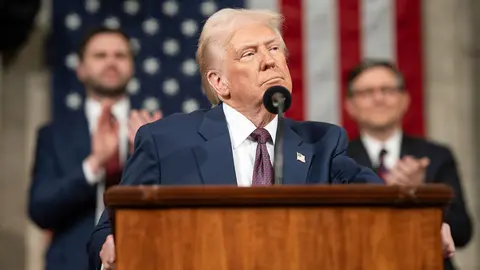Trump in Saudi Arabia

He may find the luxury of the palaces inspiring, or perhaps he enjoys being surrounded by millionaires with whom he can negotiate with the card of the US presidency on the table. ‘It's a beautiful place, isn't it,’ he says.
Trump is comfortable in Saudi Arabia, and it shows. It is an ally with a desire for continuity, solvent, committed to the essential lines of its policy and in the process of repositioning its image through sport washing and diversifying its investments in non-hostile territories. The common enemy is Iran and the terrorism it promotes.
Even Syria now has a government more sympathetic to the Saudis, and the United States is going to ease economic sanctions so that it can rebuild the country. To be a perfect ally, it only needs to take two more steps: contribute to common defence with more purchases and better weapons, and sign the Abraham Accords with Israel. The Saudis have said yes to the first. As for the second, for the moment, the answer is no.
The New York Times places the president's trip alongside information anticipating the predictable strategic shift of the US Navy in the Pacific, where it intends to strengthen its presence and modernise its defence and communications systems.
To do so, it must shift more budgetary and innovation efforts to that region, while at the same time demanding greater commitment from its allies in other regions. One is Europe. Another is the Middle East, where strategic players such as Saudi Arabia and the United Arab Emirates can play a significant role in maritime and air surveillance and security. Meanwhile, Qatar can add more value and better coordination to its mediating role in stabilising Syria and, above all, Gaza.
Trump has secured mutual investment agreements with the Saudis and the Emiratis in various sectors, including technology and artificial intelligence. And with the Qataris, he has brokered a deal that includes the purchase of 210 Boeing aircraft. This confirms that his strategy of using the economy and trade as instruments to develop foreign policy makes sense in a competitive and therefore open world. However, the agreements reached do not eliminate the risks of Iranian nuclearisation. Nor do they guarantee the cessation of the activities of terrorist and criminal groups that remain operational on the periphery of Arabia. Nor do they guarantee the healing of the terrible wounds that still remain in the region.
The most painful of these is Gaza and the Palestinian-Israeli conflict, which has no solution unless the reconstruction of the territory is accompanied by diplomatic action to rebuild the political channels for future understanding. The Arab countries are of paramount importance in activating these channels, as has been attempted with the Abraham Accords. They are also crucial in Syria, where Turkey will also be a key player in stabilisation.
For all these reasons, the economic and transactional success of President Trump's first foreign trip depends on the diplomatic activity that the United States can develop from now on in a region where, in addition to strengthening its traditional allies, it must reduce levels of hostility and the causes of radicalisation. The Arabian Peninsula cannot be a raft of prosperity in the middle of an ocean of debris. Even less so when the geopolitical periphery is surrounded by influential powers such as Iran and Pakistan, armed groups in the Red Sea and the Horn of Africa, incessant maritime traffic in the Suez and Strait of Hormuz, and the long shadow of the Black Sea.



